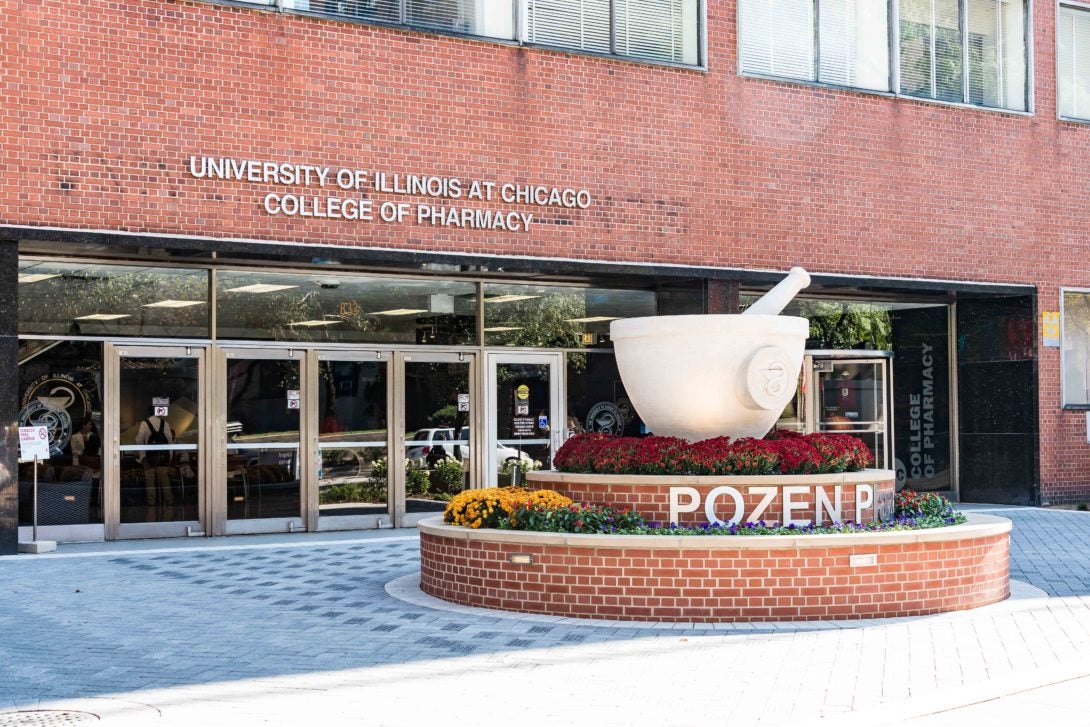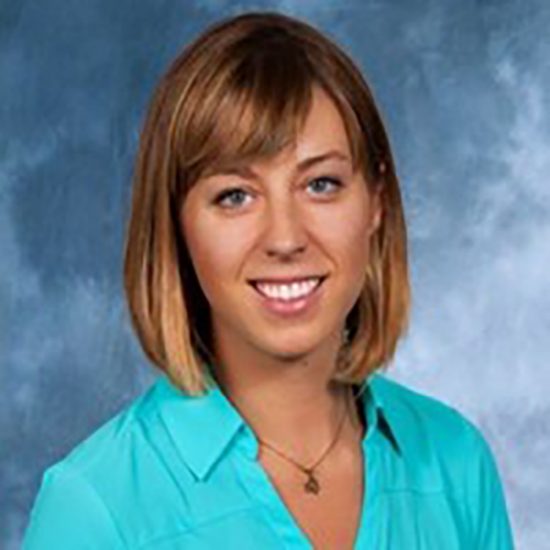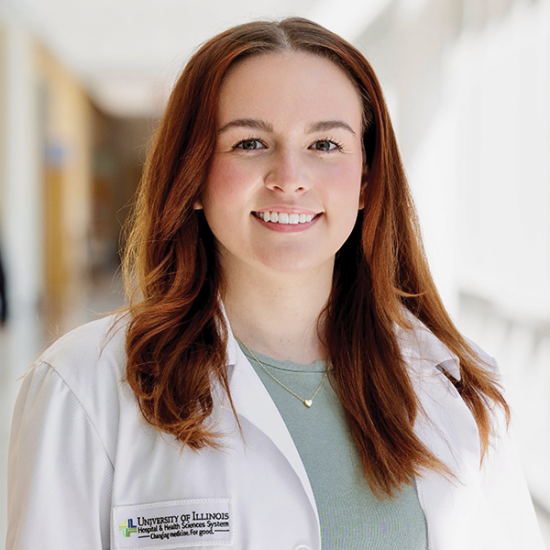Ambulatory Care
PGY1 pharmacy actions
Video description
Interested applicants are encouraged to view this short video to better understand Chicago, UIC College of Pharmacy, UI-Health Clinics, and this residency program.
video
Location

Pharmacy residency training programs are held within the College of Pharmacy at the University of Illinois Chicago (UIC) and the University
of Illinois Medical Center. The Department of Pharmacy Practice, the department of all residency trainees, is the most comprehensive unit of its
type in the United States and continues a tradition of exemplary service through its mission of providing quality education, research, and patient
care. The department educates and trains students, residents, and fellows as well as practicing pharmacists to become nationally recognized for
their leadership, knowledge and competence in practice, research, and teaching.
Virtual Information Sessions
None are currently scheduled.
Program Information
The Ambulatory Care Pharmacy Residency at the University of Illinois Chicago College of Pharmacy is a 12-month, structured, ASHP-accredited PGY2 residency. The goal of this residency is to develop expert knowledge and skills in the provision of pharmacotherapy to ambulatory care patients by combining clinical service with educational and scholarly activities. During the program, the resident will spend about 60 -70% of the time in professional clinical skill development, 10% in educational activities, 15% in scholarly/research activities and 5% in staffing activities.
Program
Purpose of Residency
PGY2 pharmacy residency programs build on Doctor of Pharmacy (Pharm.D.) education and PGY1 pharmacy residency programs to contribute to the development of clinical pharmacists in specialized areas of practice. PGY2 residencies provide residents with opportunities to function independently as practitioners by conceptualizing and integrating accumulated experience and knowledge and incorporating both into the provision of patient care or other advanced practice settings. Residents who successfully complete an accredited PGY2 pharmacy residency are prepared for advanced patient care, academic, or other specialized positions, along with board certification, if available.
Goals of the Residency
The PGY2 Ambulatory Care Residency will use the required competencies, goals, and objectives for PGY2 Ambulatory Care Residencies set forth by ASHP.
In addition, the following elective competency areas, goals, and associated objectives are taught and evaluated during the residency program year:
- Competency Area E1: Academia
- Goal E1.1: Demonstrate understanding of key elements of the academic environment and faculty roles within it.
- Goal E1.2: Exercise case-based and other teaching skills essential to pharmacy faculty.
- Goal E1.3: Develops and practices a philosophy of teaching.
- Competency Area E5: Specialty Pharmacy
- Goal E5.1: Effectively fulfill the major functions of a specialty pharmacist, including intake, clinical management, fulfillment, and facilitating optimal outcomes.
General
The residency year is divided into four, 2 ½-month learning experience blocks. The month of December is a dedicated research month. In June, the resident will function more independently in the clinics of their choice.
During each of the 4 blocks, the resident will attend clinic in one required site for at least 2 days per week. The remaining days in each block will be filled with elective clinical learning experiences. Required clinical learning experiences are listed as such under ‘Training Site and Facility,’ while other longitudinal required experiences are listed below. Longitudinal clinical experiences (e.g., 1-2 days per week for 5 months) will also be available for some clinics. Most of these clinics are on the UIC campus, however off-site experiences in various affiliated ambulatory care practice models may be arranged upon request.
Other Required Learning Experiences
- Orientation (in July)
- Ambulatory Care Administrative projects (longitudinal throughout the year)
- Teaching (longitudinal)
- Staffing: Specialty Care Building Pharmacy and Opioid Use Disorder Transitions of Care service (longitudinal)
- Research (longitudinal)
- Specialty Pharmacy (incorporated into a specialty clinical rotation and/or specialty pharmacy call center time)
Teaching Responsibilities
The resident will be a Clinical Instructor in the Department of Pharmacy Practice at the Retzky College of Pharmacy and will be given many opportunities to develop didactic and clinical teaching skills including lecturing, facilitating small group discussions, providing seminars and in-services to health care professionals, and interacting with pharmacy students during their introductory and advanced pharmacy practice experiences. The resident will be required to lead small group topic discussions throughout the year for fourth-year Doctor of Pharmacy students and present at least one didactic lecture to the Doctor of Pharmacy students as part of the Advanced Topics in Ambulatory Care elective. The resident may choose to participate in the Resident Teaching Certificate Program, if not completed during their PGY1 training, and is required to participate in the Academic Leadership Program offered to PGY2 residents and fellows. Completion of additional teaching activities throughout the course of the residency year are encouraged, but additional activities beyond those required should be approved by the RPD and should not hinder the other required residency activities.
Research Responsibilities
The resident must complete a self-directed research project. The scope of the project may vary according to individual interests but must be completed in a manner for presentation and publication. The resident will be given 1 day per week for project/research time. This project will be presented by the resident at the Illinois Pharmacy Resident Conference or another equivalent meeting in the spring of the residency year.
Staffing Requirements
The resident will be required to participate in off-hours service coverage throughout the year. This includes weekend staffing in one of the ambulatory care pharmacies (Specialty Care Building [SCB] Pharmacy) and coverage for the institution’s Opioid Use Disorder Transitions of Care service. Additionally, other off-hours service-related projects and activities (such as immunization clinics, community outreach projects, or group education programs) may be recommended.
Seminar Requirement
The Ambulatory Care resident is required to prepare and deliver a one-hour ACPE-accredited seminar during the first half of the year.
Additional Benefits
Support for travel to ASHP’s Midyear Clinical Meeting will be provided. Travel expenses for additional meetings may also be covered. The resident will be given sick time and two weeks vacation and will be eligible for medical, dental, vision and life insurance.
Requirements for Application
Applicants must hold a PharmD degree from an ACPE-accredited college of pharmacy and be licensed or eligible for licensure in the State of Illinois. Completion of an ASHP-accredited PGY1 residency is required. Selection will be based on a completed PhORCAS application, three references, college transcripts, and a virtual interview.
Training Site & Facility
Required Clinical Learning Experiences
- Antithrombosis Clinic
- Family Medicine: Choice of University Village or Mile Square
- Internal Medicine Clinic
- Medication Therapy Management Clinic
- Population Health/Managed Care
Elective Clinical Learning Experiences
- Heart Failure
- Dialysis
- Digestive Diseases/Liver
- Electrophysiology
- Emergency Medicine
- HIV/Infectious Disease
- Medication Assisted Recovery Clinic
- Neurology
- Oncology
- Pediatrics
- Psychiatry
- Pulmonary
- Rheumatology
- Smoking Cessation
- Specialty Pharmacy
- Telemedicine
- Transplant
- Women’s Health
Preceptors
Current
2024 – 2025 Hannah Ayers
2024 – 2025 Carrie Yu
History
Since 1969, over 300 pharmacists successfully trained in our ASHP-accredited first-year post-graduate residency program. In addition, we have graduated over 100 individuals in our various specialized pharmacy residencies that encompass a wide range of fields that is second to none. Our diverse faculty, in combination with the numerous progressive practice sites, provides our residents with an experience like no other. Our residency alumnae hold prominent positions within pharmacy academia, industry, and professional organizations nationwide and are leaders in the world of pharmacy practice. We are proud of our tradition, our outcomes and our graduates and with the increasing expectations of the public and other health professionals to improve the lives of patients, we are confident that our residency programs will grow and develop to meet this challenge.
Past Residents in Ambulatory Care
- 2023 – 2024 Deepali Bhandari
- 2023 – 2024 Christine Pan
- 2022 – 2023 Reham Awad
- 2022 – 2023 Mukti Patel
- 2021 – 2022 Erin Hermes, Hali Hanson, Sylvia Ou
- 2020 – 2021 Niha Idrees, Lauren Speakman
- 2019 – 2020 Lauren Cunningham, Hannah Whittemore
- 2018 – 2019 Kristina Falk, R. Kane Stafford
- 2017 – 2018 Kaitlyn Craddock, Rachel Murdock
- 2016 – 2017 Carol Chan, Suzanne Molino, John Shilka
- 2015 – 2016 Adenike Atanda, Ellen Chackunkal
- 2014 – 2015 Maika Patino
- 2013 – 2014 Shubha Bhat, Sarah Perez
- 2012 – 2013 Christine Rash
- 2011 – 2012 Rebecca Stone
- 2010 – 1011 Tara Gleason
- 2009 – 2010 Kelly Cochran
- 2006 – 2007 Sandra Kim
- 2005 – 2006 Sneha Baxi
- 2004 – 2005 Huzefa Master
- 2000 – 2001 Simon Lee, Christine Rivers
- 1999 – 2000 Isaac Cha, Latha Radhakrishnan
- 1998 – 1999 Jennifer Mitchell, Allen Shek, Alice Park
- 1997 – 1998 Jennifer White
- 1996 – 1997 Lori Johnston, Jamie Finley, Mahtab Hariri-Salehi, Jill Dischler
- 1995 – 1996 Nancy Lasack, Edith Nutescu, Tricia Kokoski, Deborah Silverstein

Liz Van Dril, PharmD, BCPS, BCACP, CDCES
Clinical Assistant Professor, Pharmacy Practice
PGY2 Ambulatory Care Program Director
